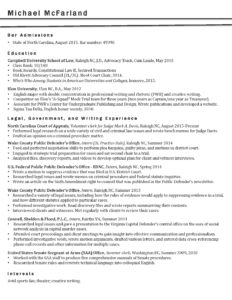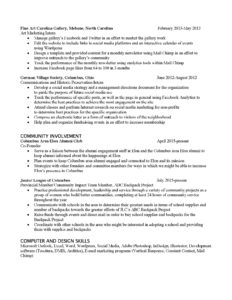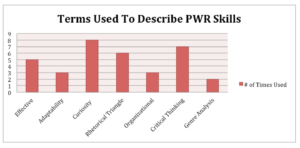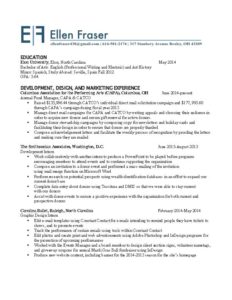Guest Blogger Rebecca Porter ’16
As previously discussed in the last CUPID blog post (link here) how you market yourself is important, especially when trying to tap into the professional world. Yet, there is more than one way to do this. After surveying PWR alumni, I have described the top answers I’ve received: well-written resumes, and portfolios such as personal blogs or websites. Other answers that were common were social media outlets, such as LinkedIn and Twitter, and spreadsheets.
Let’s begin with resumes. Resumes show future employers your skill sets and qualifications. Many reviewers do not spend a lot of time looking over resumes so it’s important to stand out but also customize your resume to the job you are applying for. Miranda Allan ’15 states, “I also start by highlighting my skills/projects in a separate column, which I plan to revise according to whatever job I’m applying for. I’m trying to abide by the ‘30 seconds or less’ rule of thumb.” Quickly glance over your resume; does your document match what the employer is looking for? The job application will specifically reference skills that they would like a future employee to have and it’s important that you add those into your resume. Ellen Fraser ’14 calls these “buzz words” and says, “I have a different resume for every single job I’ve ever applied to.” Hillary Dooley ’14 further adds onto this idea by stating, “The easier it is for the reader to make the connection between the experience on your resume and the job description, the better. An effective resume is well organized, tailored to the job, and includes a few visually appealing elements.” If you need help thinking of “buzz words” these are the common terms used to do so:
For instance, here are two resumes from successful PWR alumni, Ellen Fraser ‘14 and Michael McFarland ‘12. At first it might be easy to notice the difference in colors and font, but also notice the difference in content.
 Michael explains his resume saying, “It is concise and highlights qualities that District Attorneys and criminal defense lawyers look for. My interest section is also very helpful in marketing myself. I used to be against having an interests section, is a good way of showing a more complete picture of myself. I have now had multiple interviews where people brought up my interests section and it seems like a good way to get a conversation started in an interview. The interests I selected help show my strengths as a lawyer as well.”
Michael explains his resume saying, “It is concise and highlights qualities that District Attorneys and criminal defense lawyers look for. My interest section is also very helpful in marketing myself. I used to be against having an interests section, is a good way of showing a more complete picture of myself. I have now had multiple interviews where people brought up my interests section and it seems like a good way to get a conversation started in an interview. The interests I selected help show my strengths as a lawyer as well.”
Ellen states, “it helps on your resume when you are listing your responsibilities to say what the purpose of your responsibility was…(i.e. held events in order to get attendees excited about your organization’s mission…)” to make sure you are setting yourself apart in the field that you are applying to.
 Therefore with resumes, context is everything.
Therefore with resumes, context is everything.
Another important aspect to keep in mind is visual rhetoric. Generally alumni agreed to try to keep your resume at the length of one page but of course there are exceptions to the rule. But personal branding is important. The choices you make in font and color matter. Rhetorically ask yourself of the decisions you are making and the reasons why you are picking certain colors and laying out your information in a specific order. Remember peer feedback? Alumni continuously say that they still find value in peer editing because it is helpful to have another pair of eyes looking at a document.
Want to know how to create an effective website or blog? Read my next post to find out.



 Follow
Follow